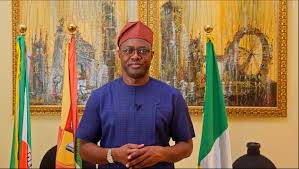Notably and without equivocation, Governor Seyi Makinde has performed exceedingly well in the delivery of his campaign promises in virtually all sectors. This is the case most especially in the area of employment and job creation.
From his first term of office, the governor made it clear that aside from the four service point agenda of education, security, health and economic expansion, his administration would focus on reducing the unemployment rate in the state.
Throughout his first four years, the governor lived true to his words with various policies implemented towards empowering the teeming youths of the state. Aside from the recruitment of 7,000 teachers into public secondary schools in 2020, the governor introduced the Youth Entrepreneurs in Agribusiness Programme, which saw thousands of Oyo State youths sponsored for all kinds of training in agriculture and agribusiness practices at the CSS Integrated Farms in Nasarawa State.
If the first term of Governor Makinde presented job opportunities to youths, the second term has even been better. The transformation agenda embarked upon by Makinde’s administration on improving the lives of Oyo State youths and their family members have reflected in different forms of job recruitments undertaken by the government since the governor’s re-election.
The governor began with the education sector, where he approved the recruitment of about 20,000 teaching and non-teaching staff into public primary and secondary schools. Among the non-teaching staff categories recruited by the state government are caregivers, who will provide care and support to learners, clerical officers, assistant executive officers, data processors/confidential secretaries, guards and messengers. The wholesomeness of the recruitment into the public education sector means that public schools in the state will start giving private schools a run for their money in the not-too-distant time.
In all these recruitments, the governor not only gave an express instruction for people living with disabilities to be factored into the exercises, he ensured that the instruction was followed to the letter with over 500 people with special needs employed into the primary and secondary schools.
Through these recruitments, the governor has, no doubt, lived up to the cognomen of Oyo State as a Pacesetter State, with the transparency and probity introduced to recruitment into the education sector in the state proving to be a model for other states.
The governor was able to achieve an unprecedented and exemplary feat in public recruitment through the experienced hands that he chose to man the different arms of the education sector and the civil service commission. From the Honourable Commissioner, Professor Salihu Adelabu, a professor of Finance and Public Management with a strong background in education, to the chairman of the Oyo State Universal Basic Education Board, Dr Nureni Adeniran, a Ph.D holder and former lecturer in Education, to the chairman of the Civil Service Commission, Alhaji Kamoru Aderibigbe, a retired teacher as well as Pastor Akin Alamu, the former TESCOM chairman, a well-experienced administrator, Governor Makinde’s penchant for putting round pegs in round holes has paid off greatly in the recent spate of merit-based employments into different Ministries, Departments, Agencies and schools in the state.
Relatively speaking, the Oyo State’s education sector has witnessed a significant development, with a significant milestone that will certainly revitalise the education sector in the state. Apart from addressing the shortage of qualified teachers and other hands in the state’s education sector, the effort is also expected to improve the standard of education and further improve Oyo State students’ performance in national examinations.
For years, Governor Makinde has always declared that he is here to reposition the education sector and rebuild the state through improved education quality. The massive recruitment of teachers is a testament to that commitment to providing quality education to the people of Oyo State, as the new teachers will surely help to improve the teacher to students’ ratio, enhance the learning experience, and ultimately contribute to better academic outcomes.
With this development, the Oyo State Government has reaffirmed its dedication to investing in the future of its citizens and providing them with the necessary education needed to expand the economy of the state and boost individual lives.
Apart from the education sector, the government also embarked on the recruitment of thousands of residents into the mainstream civil service and the local governments.
The recruitment processes were rigorous, involving a computer-based test (CBT) and a comprehensive evaluation of candidates’ qualifications.
The Oyo State Civil Service Commission recently recruited over 900 candidates into the commission and they have collected their appointment letters, while the state also completed the conversion of over 1,500 ad-hoc staff of the 33 local government councils in the state to permanent staff.
Overall, Governor Makinde has, through the series of recruitments, demonstrated a commitment to merit, excellence, and inclusivity, ensuring that the best candidates are selected to serve the people of Oyo State. Oyo State can boast of having witnessed a significant improvement in its recruitment processes under Governor Makinde’s administration, as the processes were a complete departure from the status quo of previous administrations sharing employment letters at political rallies.
In Oyo State of today, recruitment exercises have been transparent, fair, and merit-based, leading to best candidates being selected for various positions. For this, Nigerians have continued to praise Governor Makinde’s administration for its efforts in reforming the recruitment process, making it more inclusive and prioritising the needs of the people. Certainly, Governor Makinde has not only been setting the unprecedented record of overseeing the largest recruitments into civil/public service, he has been showing the rest of Nigeria how best to conduct public recruitments. One hopes that states and even the Federal Government will learn to make recruitments less opaque and more people-centred.
.Comrade Gbadeyanka writes from Ibadan













